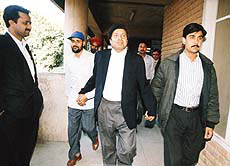Jerath gets 9-day police
remand
Tribune
News Service
CHANDIGARH, Nov 27 —
Bowing to the inevitable, K.K. Jerath, Chief Engineer
(suspended) of the Chandigarh Administration, today
surrendered in the court of the Judicial Magistrate, Mr
Jasbir Singh.
The
Magistrate remanded him in police custody for
nine days. He, however, spurned the request of
the Administration for handcuffing him. He
directed the prosecution to get Jerath medically
examined at the General Hospital.
Accompanied by his counsel, Jerath, who looked
shaken, appeared before the Magistrate the moment
he emerged from his chamber to the courtroom and
occupied his chair on the dais. |

K. K. Jerath
being taken away from the District Court by
Vigilance Department staff. — Tribune photo
by Pankaj Sharma |
Counsel presented an
application before the Magistrate praying for getting him
medically examined before passing order for his remand
— judicial or police.
The Magistrate issued
notice to the Administration for 1.30 p.m. and directed
that Jerath be lodged, in the meanwhile, in judicial
lockup, situated in the basement of the District Courts
building.
At 1.30 p.m. counsel for
the Administration, along with Jerath, and a team of the
Vigilance Department led by the OSD, Mr Asa Nand,
consisting of Inspector Prem Chauhan, Sub-Inspector
Sukhdev Singh, descended on the court premises. Jerath
was produced in the courtroom by the jail staff.
Seeking the maximum 14-day
police remand permissible under the Criminal Procedure
Code, the Public Prosecutor pleaded with the court that
Jerath had been at large for eight months. He also
charged Jerath with fleeing the country. He said the
prosecution needed Jerath for sustained custodial
interrogation for solving the kickbacks case.
Continuing his arguments,
the Public Prosecutor pleaded that in November last year
a raid was conducted on Jerath's house. He claimed that
jewellery and a substantial cash was recovered from his
possession.
The Public Prosecutor told
the court that during the raids on the houses of three
alleged middlemen — Suresh Sharma, Dinesh Sharma,
and Sunil Kalia — certain diaries were seized by the
Income Tax Department. These diaries contained entries of
the kickbacks paid to Jerath and other officials of the
Engineering Department. The Administration was to
establish his links with these middlemen.
He said the case against
Jerath was registered on February 3, 1998. His prayer of
anticipatory bail was rejected first by the Punjab and
Haryana High Court and later by the Supreme Court. He was
declared a proclaimed offender and his property ordered
to be attached. He had been evading arrest for eight
months.
Pulverising the stand of
the administration, counsel for Jerath told the court
that the Public Prosecutor had twisted facts to influence
the court. He said the Vigilance Department was not to
recover anything from Jerath's possession. He brought to
the Magistrate's notice the two raids were conducted on
the house of the Chief Engineer. While one raid was
conducted by the Income Tax Department, the other was
conducted by the CBI. All papers, including documents
pertaining to his assets, were seized by these agencies.
He argued that Jerath had
been under suspension almost for more than one year.
Hence, he had no access to official records. What could
the Vigilance Department recover from him? he asked.
As for his connection with
the middlemen and other officials of the Engineer
Department, all of them had already been arrested,
subjected to custodial interrogation and enlarged on
bail. Therefore, the prosecution must have ascertained
whatever it wanted to from middlemen and officials.
Therefore, there was hardly any justification for
granting the police remand.
He brought to the notice
of the court that Jerath had been ill all these months.
He had sent a number of medical certificates. "There
is a PGI record showing that Jerath has been suffering
from heart problem." This record pertained to the
period much before the Vigilance Department had
registered the case. "Therefore, there was no
question of his evading arrest," he asserted.
The defence counsel
asserted that whatever argument the Public Prosecutor had
trotted out was the "tutored version of the Home
Secretary with whom Jerath had inimical relations."
He told the court that Jerath had in possession certain
letters exchanged between Jerath and the Home Secretary.
These letters had not been rebutted by the prosecution.
Jerath had impleaded the Home Secretary as a party both
in the High Court and the Supreme Court.
He told the court that
because of his inimical relations with the Home
Secretary, Jerath apprehended that he would be subjected
to torture because is is also the Chief Vigilance Officer
and the head of the Vigilance Department which was
investigating the case. It was for this reason that he
was praying for getting Jerath medically examined.
The defence counsel argued
that more than nine months had gone by since the case
against Jerath had been registered. The investigation
ought to have been over by now. Therefore, there was
hardly any justification for the police remand.
Some of the legal
luminaries, however, pointed out that the proceedings
under Sections 82 and 83 of the Criminal Procedure Code
could be conducted only by the Special Judge appointed
under the Prevention of Corruption Act, and not by a
judicial magistrate. In support of their contention, they
pointed out, that this ruling was given by the Supreme
Court in the AR Antulay case.
|

